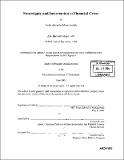Sovereignty and intervention in financial crises
Author(s)
Mousavizadeh, Nader Alexander, 1969-
DownloadFull printable version (4.154Mb)
Other Contributors
Sloan School of Management.
Advisor
Richard Locke.
Terms of use
Metadata
Show full item recordAbstract
Sovereignty today is conditional, compromised and contractual in ways that require a reassessment of the doctrine of sovereignty in an era of globalization and global capital markets. Taking as a case study Indonesia during its financial crisis in 1997-1998, this thesis explores the sovereign ability of a state such as Indonesia to act effectively and independently in its own economic interest in a crisis. The argument of this thesis that sovereignty today is conditional, compromised and contractual to an unprecedented degree rests on two pillars: first, that a universal awareness of human rights increasingly has imposed a contract on sovereign leaders demanding, as a condition for the right to sovereign non-interference, that they respect the most fundamental human rights of their citizens. Second, as the case of Indonesia will demonstrate, that in the global economy where contagion is a real and dangerous phenomenon, countries must accept IMF conditionality or find themselves cut off not only from assistance from the International Financial Institutions but, more importantly, from private investors whose loss of confidence in an economy can trigger a serious financial crises with severe long-term consequences for the society as a whole.
Description
Thesis (M.B.A.)--Massachusetts Institute of Technology, Sloan School of Management, 2004. "June 2004." Includes bibliographical references (leaves 82-86).
Date issued
2004Department
Sloan School of ManagementPublisher
Massachusetts Institute of Technology
Keywords
Sloan School of Management.